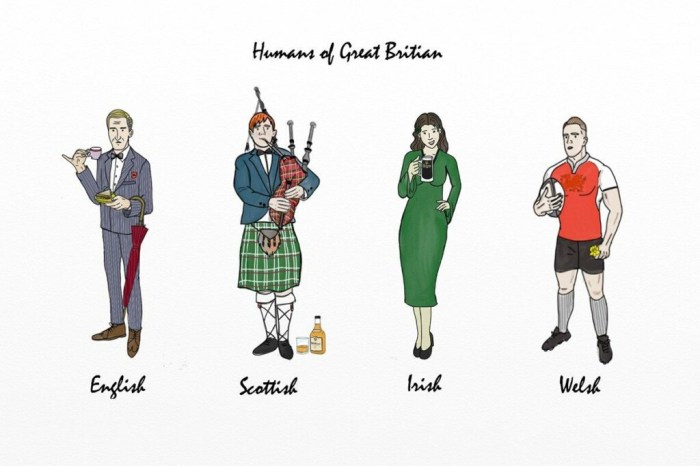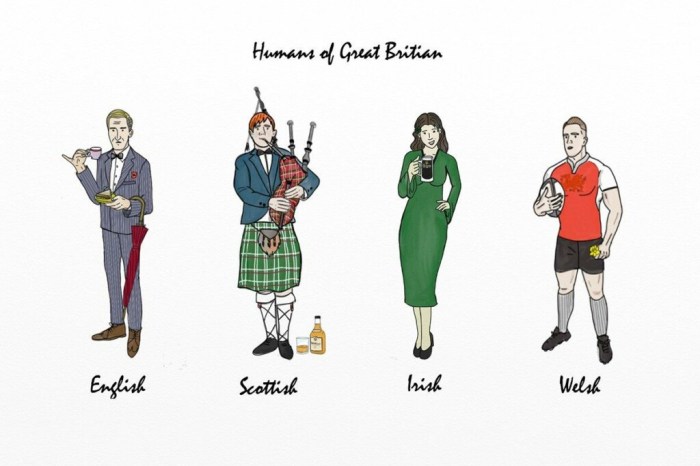Great Britain stereotypes have permeated popular culture, shaping perceptions of its people and society. From the reserved stiff upper lip to the tea-loving royals, these stereotypes have both amused and intrigued outsiders for centuries. This article delves into the origins, evolution, and accuracy of these widely held beliefs, exploring the complex interplay between history, culture, and media.
Beyond the stereotypical images, we will uncover the unique cultural practices, historical events, and social structures that have shaped British identity. By examining regional variations, class systems, and international relations, we aim to provide a nuanced understanding of the complexities that lie beneath the surface of these stereotypes.
Stereotypical Characteristics
Great Britain and its people have been the subject of numerous stereotypes throughout history. These stereotypes have evolved over time, reflecting the changing perceptions of British society and culture.
Some of the most common stereotypes associated with Great Britain include:
- Politeness and reserve:The British are often seen as polite and reserved, with a strong sense of etiquette.
- Love of tea:The British are known for their love of tea, which is often served with milk and sugar.
- Bad teeth:The British have a reputation for having bad teeth, which is often attributed to the country’s high sugar consumption.
- Eccentricity:The British are often seen as eccentric, with a quirky sense of humor.
- Colonialism:Great Britain has a long history of colonialism, which has left a lasting impact on its culture and society.
Origins and Evolution
The origins of these stereotypes can be traced back to the 18th and 19th centuries, when Great Britain was a major world power. During this time, the British Empire expanded rapidly, and British culture and values were spread to all corners of the globe.
The stereotype of the polite and reserved British gentleman emerged during the Victorian era, when the country was at the height of its power. This stereotype was reinforced by the writings of popular authors such as Jane Austen and Charles Dickens.
The stereotype of the British as tea lovers also originated during the Victorian era. Tea became a popular drink in Britain in the 18th century, and it quickly became a symbol of British culture.
The stereotype of the British as having bad teeth is a more recent phenomenon. It is thought to have originated in the 19th century, when sugar became more widely available in Britain. The high sugar consumption led to an increase in tooth decay, which gave rise to the stereotype.
The stereotype of the British as eccentric is a more difficult one to pin down. It is thought to have originated in the 18th century, when British society was undergoing a period of great change. This period saw the rise of new ideas and values, which led to a more diverse and eccentric British culture.
Accuracy and Prevalence
The accuracy and prevalence of these stereotypes vary. Some stereotypes, such as the stereotype of the polite and reserved British gentleman, are more accurate than others. This stereotype is still widely held today, although it is important to note that not all British people fit this stereotype.
Other stereotypes, such as the stereotype of the British as having bad teeth, are less accurate. While it is true that the British have a higher rate of tooth decay than some other countries, this is not a universal problem.
In fact, many British people have excellent teeth.
The stereotype of the British as eccentric is also difficult to assess. It is true that British culture is more diverse and eccentric than some other cultures. However, it is important to remember that not all British people are eccentric.
Overall, the stereotypes associated with Great Britain are a complex and varied mix of truth and fiction. Some stereotypes are more accurate than others, and the prevalence of these stereotypes varies from country to country.
Cultural Peculiarities
British culture is a rich tapestry of traditions and customs that have evolved over centuries. These peculiarities are influenced by the country’s history, geography, and social values. They shape the daily lives of British people in various ways, from their etiquette to their sense of humor.
One of the most striking cultural peculiarities of Great Britain is its formality. The British are known for their politeness and reserve, and they often adhere to strict rules of etiquette. For example, it is considered rude to speak loudly in public, and it is customary to queue (line up) in an orderly manner.
Politeness and Courtesy
Politeness is highly valued in British culture. Common phrases like “please,” “thank you,” and “excuse me” are used frequently. It is considered rude to interrupt someone while they are speaking, and it is customary to wait one’s turn in line.
Sense of Humor
The British are also known for their sense of humor. They often use irony and sarcasm, and they are not afraid to laugh at themselves. British humor can be quite different from American humor, and it can sometimes be difficult for foreigners to understand.
Pub Culture
Pub culture is an important part of British life. Pubs are social hubs where people go to meet friends, have a drink, and watch sports. Pubs are often lively and welcoming, and they play a vital role in the community.
Afternoon Tea
Afternoon tea is a traditional British meal that is typically served between 3 and 5 pm. It consists of tea, sandwiches, scones, and cakes. Afternoon tea is often served in a formal setting, and it is considered a special occasion.
Tea and Biscuits
Tea and biscuits are a staple of British culture. Tea is the most popular drink in the UK, and it is often served with biscuits (cookies). Tea and biscuits are often enjoyed as a snack or as a way to relax.
Queueing
Queueing is a British institution. The British are known for their patience and their ability to queue in an orderly manner. Queuing is seen as a sign of respect, and it is considered rude to push or shove in line.
Historical Events and Personalities

Throughout history, significant events and influential figures have played a pivotal role in shaping British stereotypes and the national identity. These include:
The Industrial Revolution
The Industrial Revolution (1760-1840) transformed Britain from an agricultural society into a global industrial powerhouse. This period of rapid economic growth and technological advancement led to the rise of industrial cities, the growth of the middle class, and the emergence of a new social order.
The Industrial Revolution also shaped British stereotypes of industriousness, practicality, and a strong work ethic.
The British Empire
The British Empire (1583-1947) was one of the largest empires in history, spanning across the globe. Its vast reach and influence left a lasting impact on British culture and society. The empire’s colonial legacy has shaped stereotypes of British arrogance, superiority, and a tendency towards imperialism.
Queen Victoria
Queen Victoria (1837-1901) was a long-reigning monarch who symbolized the height of British power and influence. Her reign was marked by economic prosperity, social reforms, and the expansion of the empire. Queen Victoria’s image and values have become synonymous with Britishness, including a sense of duty, propriety, and a strong moral code.
Winston Churchill
Winston Churchill (1874-1965) was a wartime Prime Minister who led Britain to victory in World War II. His leadership and charisma during the war years solidified British stereotypes of resilience, determination, and a “stiff upper lip” in the face of adversity.
Regional Variations
Great Britain is a diverse country with a rich cultural heritage. Different regions of the country have their own unique characteristics and traditions, which have contributed to the development of regional stereotypes.
One of the most striking regional variations is in the way people speak. The English language has many different dialects, each with its own unique pronunciation, grammar, and vocabulary. For example, people in the north of England tend to speak with a broader accent than people in the south.
They also use different words for common objects, such as “pop” instead of “soda” and “lorry” instead of “truck.”
Another regional variation is in the way people dress. In general, people in the north of England are more likely to dress casually, while people in the south are more likely to dress formally. This is reflected in the different types of clothing stores that are found in different regions of the country.
Regional variations also exist in the way people eat. For example, people in the north of England are more likely to eat traditional British dishes, such as fish and chips and Yorkshire pudding. People in the south are more likely to eat international cuisine, such as Italian and Indian food.
These are just a few of the many regional variations that exist in Great Britain. These variations have contributed to the development of regional stereotypes, but it is important to remember that these stereotypes are just generalizations and that there is a great deal of diversity within each region.
The Impact of Regional Variations on British National Identity
The regional variations that exist in Great Britain have had a significant impact on the development of British national identity. These variations have helped to create a sense of diversity and uniqueness within the country. They have also helped to shape the way that British people view themselves and their place in the world.
For example, the strong regional identities that exist in Scotland and Wales have led to a sense of nationalism in these regions. This nationalism has led to the creation of political parties that are dedicated to the promotion of Scottish and Welsh independence.
It has also led to a growing sense of cultural identity in these regions.
The regional variations that exist in Great Britain have also had an impact on the way that British people view themselves in relation to other countries. For example, the fact that the English language is spoken in many different countries around the world has led to a sense of globalism among British people.
This globalism has led to a greater awareness of other cultures and a greater willingness to embrace diversity.
The regional variations that exist in Great Britain are a source of strength for the country. They have helped to create a sense of diversity and uniqueness within the country, and they have shaped the way that British people view themselves and their place in the world.
Class System and Social Hierarchy
The British class system is a complex and hierarchical social structure that has evolved over centuries. It is based on a combination of factors, including wealth, education, occupation, and family background.The class system has its roots in the feudal system of the Middle Ages, when society was divided into three main classes: the nobility, the clergy, and the commoners.
The nobility were the landowners and held the most power and wealth. The clergy were responsible for religious matters, and the commoners were everyone else, including peasants, farmers, and merchants.Over time, the class system became more complex, and new classes emerged, such as the middle class and the working class.
The middle class consisted of people who were not wealthy but had some education and skills. The working class consisted of people who worked in manual or low-paid jobs.The class system has had a significant impact on British culture and society.
It has shaped the way people interact with each other, the way they dress, and the way they speak. It has also influenced the way that British society is organized, with different classes having different access to education, healthcare, and other resources.
Social Classes and Stereotypes
British society is traditionally divided into three main social classes: the upper class, the middle class, and the working class. Each class has its own set of stereotypes and expectations.The upper class is often seen as being wealthy, privileged, and well-educated.
They are often associated with the aristocracy and the landed gentry. The middle class is seen as being more moderate in terms of wealth and status. They are often associated with professional occupations and white-collar jobs. The working class is seen as being less wealthy and less educated than the other two classes.
They are often associated with manual or blue-collar jobs.It is important to note that these stereotypes are not always accurate. There is a great deal of variation within each class, and there are many people who do not fit neatly into any one category.
Impact of Social Hierarchy
The class system has a significant impact on British culture and society. It influences the way that people interact with each other, the way they dress, and the way they speak. It also has an impact on the way that British society is organized, with different classes having different access to education, healthcare, and other resources.The
class system can be a source of both privilege and disadvantage. People from higher classes often have more opportunities and resources than people from lower classes. This can lead to inequalities in terms of wealth, education, and health. However, the class system can also be a source of social cohesion.
It can provide people with a sense of identity and belonging, and it can help to maintain social order.
Media Representations: Great Britain Stereotypes
British stereotypes are frequently depicted in popular media, such as films, television, and literature. These representations have a substantial impact on shaping public perceptions of Great Britain and its people.
Films
British films often reinforce traditional stereotypes of British culture. For example, the stiff upper lip, politeness, and reserve of the British are common themes. Films such as Four Weddings and a Funeral(1994) and Love Actually(2003) depict these characteristics in a humorous and endearing way.
Television
British television shows have also contributed to the popularization of British stereotypes. Sitcoms such as Keeping Up Appearances(1990-1995) and The Office(2001-2003) have presented exaggerated portrayals of British society, reinforcing stereotypes of class differences and social awkwardness.
Literature
British literature has a long history of shaping perceptions of British culture. Classic works such as Jane Austen’s Pride and Prejudice(1813) and Charles Dickens’ Oliver Twist(1838) have popularized stereotypes of British manners, social hierarchy, and poverty.
International Relations and Foreign Policy
British stereotypes have played a significant role in shaping the country’s international relations and foreign policy. These stereotypes have influenced diplomatic interactions, global perceptions of Great Britain, and even historical events.
One of the most prevalent British stereotypes is that of the “stiff upper lip.” This stereotype suggests that the British are emotionally reserved and stoic, even in the face of adversity. This stereotype has been used to explain British foreign policy decisions, such as the country’s decision to maintain a “splendid isolation” from European affairs in the 19th century.
Another common British stereotype is that of the “perfidious Albion.” This stereotype suggests that the British are untrustworthy and willing to betray their allies. This stereotype has been used to justify hostile actions against Great Britain, such as the German invasion of Belgium in 1914.
Impact on Diplomatic Interactions
British stereotypes can have a significant impact on diplomatic interactions. For example, the stereotype of the “stiff upper lip” can make it difficult for British diplomats to build rapport with their foreign counterparts. This can lead to misunderstandings and mistrust.
The stereotype of the “perfidious Albion” can also damage British diplomatic relations. This stereotype can make it difficult for Great Britain to form alliances and build trust with other countries.
Impact on Global Perceptions
British stereotypes also influence global perceptions of Great Britain. For example, the stereotype of the “stiff upper lip” can lead to the perception that the British are cold and unfeeling. This can damage Great Britain’s reputation and make it difficult for the country to build relationships with other countries.
The stereotype of the “perfidious Albion” can also damage Great Britain’s reputation. This stereotype can lead to the perception that the British are untrustworthy and unreliable. This can make it difficult for Great Britain to build alliances and cooperate with other countries.
Historical Examples
British stereotypes have affected historical events and diplomatic negotiations in a number of ways. For example, the stereotype of the “stiff upper lip” was used to justify British inaction during the Holocaust. This stereotype led to the perception that the British were indifferent to the suffering of the Jews, which damaged Great Britain’s reputation and made it difficult for the country to build relationships with other countries.
The stereotype of the “perfidious Albion” was used to justify the German invasion of Belgium in 1914. This stereotype led to the perception that the British were untrustworthy and willing to betray their allies, which made it easier for Germany to justify its invasion of Belgium.
Political and Economic Systems
The United Kingdom’s political system is a constitutional monarchy with a parliamentary democracy. The monarch is the head of state, but the real power lies with the Prime Minister and the Cabinet. The British Parliament is made up of the House of Commons and the House of Lords.
The House of Commons is elected by the people, and the House of Lords is appointed by the monarch.The British economic system is a mixed economy, which means that it includes both private and public ownership of industry. The government plays a significant role in the economy, providing social welfare programs and regulating businesses.These
political and economic systems have shaped British stereotypes and national identity in several ways. For example, the strong tradition of parliamentary democracy has led to a belief in the importance of fairness and the rule of law. The mixed economy has created a society that is both prosperous and egalitarian.
Impact of Political and Economic Factors on Stereotypes
Political and economic factors have played a significant role in the formation and evolution of stereotypes about the British. For example, the British Empire’s global reach led to the development of stereotypes about the British as being arrogant and imperialistic.
The Industrial Revolution led to stereotypes about the British as being industrious and inventive.In recent years, the British economy has been transformed by globalization. This has led to a decline in manufacturing and an increase in service industries. As a result, stereotypes about the British have changed to reflect this new economic reality.
The British are now seen as being more cosmopolitan and less insular.
Education and Language
Education and language play significant roles in shaping British stereotypes, both domestically and internationally. Education systems can perpetuate or challenge stereotypes by influencing the way individuals learn about British history, culture, and society. The English language, with its global reach and cultural influence, has also contributed to the formation and spread of stereotypes about Great Britain.
Within the British education system, the teaching of history has been criticized for perpetuating stereotypes about the country’s past. For example, the emphasis on British military victories and imperial expansion in history textbooks can reinforce the stereotype of Great Britain as a powerful and dominant nation.
Conversely, the inclusion of diverse perspectives and critical analysis of historical events can challenge these stereotypes and provide a more nuanced understanding of British history.
While Great Britain is often stereotyped as a land of rolling hills and quaint villages, its western coastline offers a dramatic contrast. From the rugged cliffs of Cornwall to the sandy beaches of Devon, the west coast is a stunning viewpoint that showcases the country’s natural beauty.
Whether you’re looking for a relaxing seaside getaway or an adventurous coastal hike, the west coast of Great Britain has something to offer everyone. For more information on the stunning scenery and attractions of the west coast, visit the west coast is stunning viewpoint .
The Role of the English Language
The English language has had a profound impact on the formation and spread of British stereotypes. As a global lingua franca, English has carried British cultural values, norms, and ideas to all corners of the world. Through literature, film, and music, British stereotypes have been disseminated and reinforced, shaping perceptions of the country and its people.
For example, the works of William Shakespeare have contributed to the stereotype of Great Britain as a nation of poets and playwrights. Similarly, British sitcoms and period dramas have popularized the image of the eccentric British character, often portrayed as witty, sarcastic, and reserved.
Social Issues and Contemporary Challenges
British stereotypes are constantly evolving, influenced by a range of contemporary social issues and challenges. These include economic inequality, immigration, Brexit, and the rise of social media.
Economic inequality has become a major issue in the UK, with a growing gap between the rich and the poor. This has led to increased social tensions and a sense of unfairness among many people.
Immigration
Immigration has also been a significant issue in recent years, with a large number of people moving to the UK from other countries. This has led to concerns about cultural identity and national security, as well as fears about competition for jobs and resources.
Brexit
The UK’s decision to leave the European Union has also had a major impact on British stereotypes. Brexit has been a divisive issue, with strong feelings on both sides. It has led to increased uncertainty about the UK’s future and its place in the world.
Rise of Social Media, Great britain stereotypes
The rise of social media has also played a role in shaping British stereotypes. Social media platforms allow people to share their views and experiences with a wider audience, which can help to challenge traditional stereotypes and create new ones.
Wrap-Up
In conclusion, Great Britain stereotypes offer a fascinating glimpse into the perceptions and misconceptions surrounding this enigmatic nation. While some stereotypes hold a grain of truth, others are rooted in outdated or exaggerated notions. By critically examining these beliefs, we can challenge simplistic assumptions and gain a deeper appreciation for the multifaceted nature of British culture and society.
FAQ Insights
Are all British people reserved and polite?
While politeness is generally valued in British society, the reserved stereotype is not universally true. British people can be as diverse and expressive as any other population.
Is tea really that popular in Britain?
Yes, tea consumption is deeply ingrained in British culture. It is estimated that the average Briton drinks around 3 cups of tea per day.
Do all British people have a sense of humor?
British humor is often characterized by wit and sarcasm, but not everyone possesses this trait. Humor is subjective and varies among individuals.



